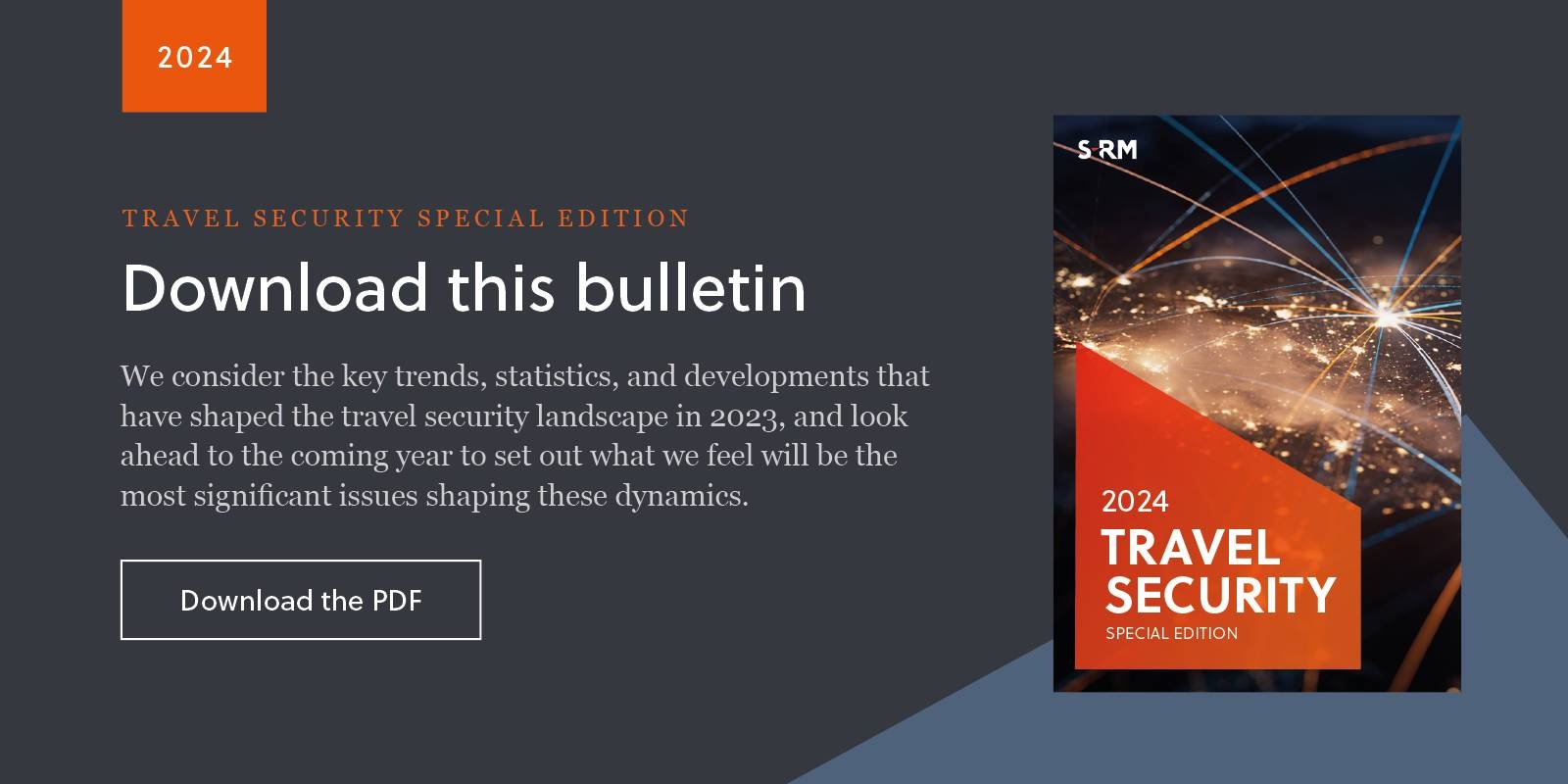Travel security risks are never static. Socio-economic changes, disease outbreaks, new technologies, political uncertainty, conflict, and many other variables inexorably shift the sands of the security landscape.
Major events with wide geopolitical ramifications – perhaps most forcefully exemplified in 2023 by the Israel-Hamas conflict – bring an immediate focus to travel security considerations, both for the affected region and for their wider global consequences. At the same time, more subtle shifts in the global landscape can have equally consequential impacts, and as such, from a risk management perspective, they too bear studying. It is with this reasoning in mind that we write our 2024 Travel Security Special Edition, exploring several important security trends and developments relevant to both personnel safety and business continuity concerns alike.
The education sector has been one area we have had a particular focus on this year. Despite education institutions being perceived as overtly safe spaces, the shifting sands mould the security environment here too, and changes in war, crime and other threat dynamics bring new challenges to educators, administrators, and school officials. As seen in the Ukraine, Sudan and Israel-Hamas conflicts, the education sector is not insulated from growing insecurity and has been subject to direct attacks and surrounding violence that has necessitated staff and student evacuations through 2023. With no clear end in sight for numerous conflicts globally, schools and universities are set to suffer from both targeted attacks and collateral damage in the coming year. Militant groups and kidnappers, too, will continue to seek targets in this sector as they have over the past 12 months, driven either by ideological or financial motivations. Finally, educational institutions across the world, but nowhere more so than in the US, will continue to seek ways to prevent or limit the impacts of indiscriminate attacks, where assailants in many cases emerge from within the institution itself.
As with playgrounds, sports grounds too are subject to a range of security threats and unscrupulous actors seeking profit. The growing value of the sporting industry, appraised at some USD 500 billion, is itself an indelibly luring prospect to banker and burglar alike. At the same time, the sports industry is not immune to political realities either, with threats and attacks against both fans and teams informed by global developments, while missteps in navigating ever-evolving and contrasting social norms can leave organisations vulnerable to social media backlash and associated reputational risks.
Challenging socio-economic conditions, policy shifts and regional instability across the globe have also left their mark on the organised crime landscape and criminal groups have had to adapt these changes. In some parts of the world, we have seen an increase in violence by such actors while elsewhere crime organisations too have felt new pressures, splintering into small groups. As authorities scramble to extinguish new and evolving organised crime activities, bystanders remain vulnerable. Increasingly, we have seen these patterns play out in commercial centres and tourist destinations over the past year, bringing with them greater need for security awareness and mitigation for business and leisure travellers that will extend well into 2024.
In the virtual world, novel and increasingly widespread technological tools in banking, dating, and the creative industries to name a few, have been embraced both by the public and by tech-savvy criminals. And now, with generative artificial intelligence having gained a firm footing in 2023 - brought to the fore by popularised applications in large language model chatbots, among others - this technology too offers criminal groups new tools for their crimes. Scams, including virtual kidnapping that involve increasingly complex deepfakes, continue to proliferate, and the coerced use of banking applications allow criminals to elicit payments and quickly empty bank accounts. Regulation and effective policing in the AI sphere are understandably slow and need to constantly evolve. At the same time, measures employed to counter the misuse of applications must be carefully balanced against creating a better experience for legitimate users. With these evolving threats, both in terms of technological developments and their broader societal backdrop, 2024 may indeed unfold as a game of cat-and-mouse between the use and misuse of new technologies.
Finally, within the shifting threat environment, the importance of expert assistance and support remain as one constant. We therefore take the opportunity in this Travel Security Special Edition to speak with a crisis response expert to dissect some of the global trends in kidnapping, political evacuations, and wrongful detention cases, discussing how these feed into and inform crisis response operators’ work.
As the sand shifts, retaining an informed and balanced understanding of the travel security landscape remains a fundamental component of organisations’ risk management protocols. Our team looks ahead to working with our clients in 2024 to help them navigate the evolving security environment and the threats they face within it.
In this edition
Education on the frontline: Security threats facing schools around the world
Conflict and violence continue to afflict educational institutions globally. Schools and universities face a range of challenges in mitigating and responding to incidents of violence, and little suggests the coming year will offer respite. Read the article.
Meeting their match: The mounting adversities confronting sporting organisations
The high-value and high-profile sports industry presents an attractive target to both criminal and militant enterprises. The targeting of sports personalities, teams, and fans by a range of threat actors, alongside growing pressure for sporting organisations to navigate reputational risks, means that the industry will need to remain vigilant and nimble to avoid potential pitfalls in 2024. Read the article.
Rolling with the times: Technological progression drives criminal innovation
New tools and innovations in technology, particularly in the realm of AI, have been widely adopted for use across industries in 2023. Unfortunately, criminals too have found these tools to develop innovative ways to scam and extort their victims. The coming year will likely see an ongoing jostle between regulators and law enforcement officers taking on unscrupulous actors, while businesses and individuals continue to fall prey to attacks. Read the article.
Insidious: Gang rivalries fuel violence in current and emerging hotspots
The shifting geopolitical landscape, alongside social and economic changes, has driven change in organised crime in 2023, both between criminal organisations jostling for control and between criminals and law enforcement. The result has been an increase in violence, with civilians increasingly caught in the crossfire in many places across the world. Read the article.
Expert interview
Amid a multitude of challenges in the travel security landscape, expert assistance remains key in providing support at the most critical times. Hearing from an experienced crisis responder sheds some light into the approach and thinking behind crucial interventions. Read the article.





